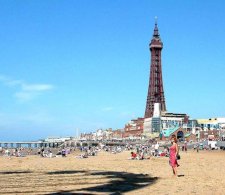An Archaeology of Fun: The Semiotics of Space, Places, and Artifacts of Blackpool and other Sea Resorts
The emergence of the cultural landscape of Blackpool can be traced back to the eighteenth century when sea-bathers began to visit this small city located at the end of a circuitous road to nowhere. It progressively became the destination of choice for the growing population of workers in the region who were going to Blackpool to spend a few days in the summer. But it mainly took off as a major working class leisure place in the early railway age when, in 1840, the town could be reached by train. Social historian John K. Walton has published in 1998 a definite historical account of the emergence of this British institution, and the ups and downs of its economic destiny (see Blackpool at Amazon).
Blackpool has acquired over time a prominent symbolic status in the realm of popular culture. The “meaning” of Blackpool is embodied in its landmark buildings, its souvenirs, and in the memories of holiday makers as well as in the remembered experience of those who toiled behind the scene to provide them with a high level of excitement for a fee.
The participants in this symposium consider Blackpool’s cultural landscape as worthy of archaeological and anthropological attention. The architecture of its emblematic beacons, the staging of its visitors’ experiences, the contents of the entertainments it provided, form a multi-layered record of some two hundred years that can be excavated from archives, literature, and survivors’ memories. It is a trove of information regarding British social and economic history, the modern origins of the entertainment industry, and the semiotics of popular culture.
This website will remain active after the end of the Sixth World Archaeology Congress. Relevant papers can be submitted for posting on this website to either Paul Bouissac (paul.bouissac@utoronto.ca) or Gerald Mars (marsgerry@googlemail.com). Specialists of other domains in the vast field of the archaeology of leisure resorts will be able to join this virtual symposium. Contributions addressing more general issues such as heritage tourism, conservation, and restoration will also be welcome.
Texts and Documents
The Future of Heritage – Changing Visions, Attitudes and Contexts in the 21st Century by John K Walton and Jason Wood
In Britain today, as elsewhere, there is a growing recognition that efforts to enhance the attractiveness and viability of heritage places must be linked to the values, interests and capacities of the people who live and work within or around them, in ways that further the distinctiveness of such locations and recognise the power of their historical legacies while stimulating their adaptation to, and anticipation of, new times and new markets. Click here to view the full document.
Reputation and Regeneration: History and the Heritage of the Recent Past in the Re-Making of Blackpool by John K. Walton and Jason Wood
British seaside resorts present particularly difficult problems as regards the ‘heritage of the recent past’. In the first place, their experience and circumstances raise contentious questions under the headings both of ‘recent’ and of ‘heritage’. Click here to view the full document.
